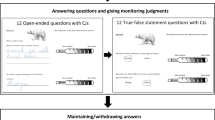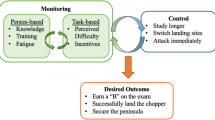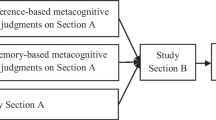Abstract
In an experiment with 56 young adults, the hypothesis was tested that information about the format of an anticipated test improves metacognitive monitoring. Half of the participants were informed about the format of the test before they started studying a text about human genetics. The other half of the sample received the same information after studying the text. All participants then answered 15 true-false inference items about the contents of the text and judged their confidence in the correctness of each answer. Whereas experimental and control group did not differ in the number of correct answers, the confidence judgments in the experimental group were more accurate and discriminated better between correct and incorrect answers than the control participants’ judgments. Furthermore, the informed participants’ discrimination performance correlated positively with their domain-related prior knowledge. The results extend earlier findings concerning the role of the test format for monitoring processes.
Similar content being viewed by others
Notes
The reduced number of degrees of freedom was due to cases in which Phi could not be computed because one of the two variables had no variance.
References
Butler, A. C., & Roediger, H. L., III. (2007). Testing improves long-term retention in a simulated classroom setting. European Journal of Cognitive Psychology, 19, 514–527.
Butler, A. C., Karpicke, J. D., & Roediger, H. L., III. (2008). Correcting a metacognitive error: Feedback increases retention of low-confidence correct responses. Journal of Experimental Psychology. Learning, Memory, and Cognition, 34, 918–928.
De Carvalho Filho, M. K. (2009). Confidence judgments in real classroom settings: Monitoring performance in different types of tests. International Journal of Psychology, 44, 93–108.
Dunlosky, J., & Lipko, A. R. (2007). Metacomprehension: a brief history and how to improve its accuracy. Current Directions in Psychological Science, 16, 228–232.
Ghatala, E. S., Levin, J. R., Foorman, B. R., & Pressley, M. (1989). Improving children’s regulation of their reading PREP time. Contemporary Educational Psychology, 14, 49–66.
Glenberg, A. M., Sanocki, T., Epstein, W., & Morris, C. (1987). Enhancing calibration of comprehension. Journal of Experimental Psychology: General, 116, 119–136.
Hacker, D. J., Bol, L., Horgan, D. D., & Rakow, E. A. (2000). Test prediction and performance in a classroom context. Journal of Education & Psychology, 92, 160–170.
Johnson, C. I., & Mayer, R. E. (2009). A testing effect with multimedia learning. Journal of Education & Psychology, 101, 621–629.
Kelliann, M. (2000). Essay vs. multiple choice examinations: A comparison of metacognitive statements generated during exam preparation. Dissertation Abstracts International Section A: Humanities and Social Sciences, 61, 1294.
Lin, L.-M., & Zabrucky, K. M. (1998). Calibration of comprehension: research and implications for education and instruction. Contemporary Educational Psychology, 23, 345–391.
Maki, R. H. (1998). Test predictions over test material. In D. J. Hacker, J. Dunlosky, & A. C. Graesser (Eds.), Metacognition in educational theory and practice (pp. 117–144). Mahwah: Erlbaum.
Maki, R. H., & McGuire, M. J. (2002). Metacognition for text: Findings and implications for education. In T. J. Perfect & B. L. Schwartz (Eds.), Applied metacognition (pp. 39–67). Cambridge: Cambridge University Press.
Maki, R., Willmon, C., & Pietan, A. (2009). Basis of metamemory judgments for text with multiple-choice, essays and recall tests. Applied Cognitive Psychology, 23, 204–222.
O’Neil, H. F., Jr., & Brown, R. S. (1998). Differential effects of question formats in math assessment on metacognition and affect. Applied Measurement in Education, 11, 331–351.
Pressley, M., Ghatala, E. S., Woloshyn, V., & Pirie, J. (1990). Sometimes adults miss the main ideas and do not realize it: Confidence in responses to short-answer and multiple-choice comprehension questions. Reading Research Quarterly, 25, 232–249.
Roediger, H. L., III, & Karpicke, J. D. (2006). The power of testing memory: basic research and implications for educational practice. Perspectives on Psychological Science, 1, 181–210.
Schraw, G. (2009). A conceptual analysis of five measures of metacognitive monitoring. Metacognition and Learning, 4, 33–45.
Schraw, G., & Dennison, R. S. (1994). Assessing metacognitive awareness. Contemporary Educational Psychology, 19, 460–475.
Sinkavich, F. J. (1995). Performance and metamemory: do students know what they don’t know? Journal of Instructional Psychology, 22, 77–87.
Thiede, K. W. (1996). The relative importance of anticipated test format and anticipated test difficulty on performance. The Quarterly Journal of Experimental Psychology, 49A, 901–918.
Thiede, K. W. (1999). The importance of monitoring and self-regulation during multitrial learning. Psychonomic Bulletin & Review, 6, 662–667.
Winne, P. H., & Hadwin, A. F. (1998). Studying as self-regulated learning. In D. J. Hacker, J. Dunlosky, & A. C. Graesser (Eds.), Metacognition in educational theory and practice (pp. 227–304). Mahwah: Erlbaum.
Winne, P. H., & Jamieson-Noel, D. (2002). Exploring students’ calibration of self reports about study tactics and achievement. Contemporary Educational Psychology, 27, 551–572.
Zankl, H. (2006). Das verflixte X. Sind Frauen intelligenter als Männer? (The blooming X. Are women more intelligent than men?). Darmstadt: Wissenschaftliche Buchgesellschaft.
Author information
Authors and Affiliations
Corresponding author
Additional information
Thanks are due to Timo Berse for supportive discussions and for helping to score the prior knowledge tests.
Appendix
Appendix
List of Concepts in the Test of Prior Knowledge
Text-related concepts (appearing in the text):
-
enzyme, gene, chromosome, mutation, symptom
Domain-related concepts (not appearing in the text):
-
haemoglobin, emulsifier, photosynthesis, endorphin, symbiosis
Rights and permissions
About this article
Cite this article
Dutke, S., Barenberg, J. & Leopold, C. Learning from text: knowing the test format enhanced metacognitive monitoring. Metacognition Learning 5, 195–206 (2010). https://doi.org/10.1007/s11409-010-9057-1
Received:
Accepted:
Published:
Issue Date:
DOI: https://doi.org/10.1007/s11409-010-9057-1




